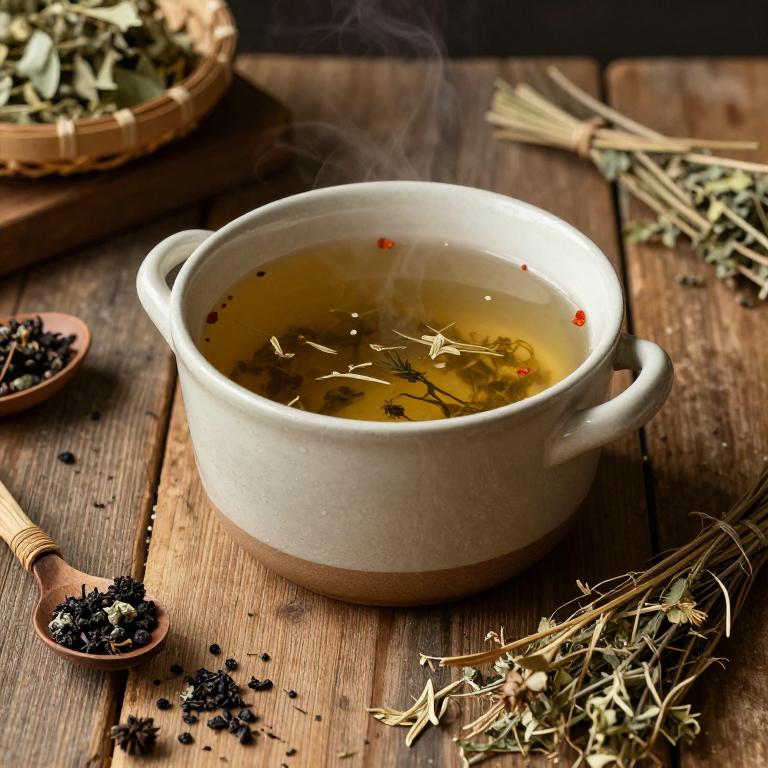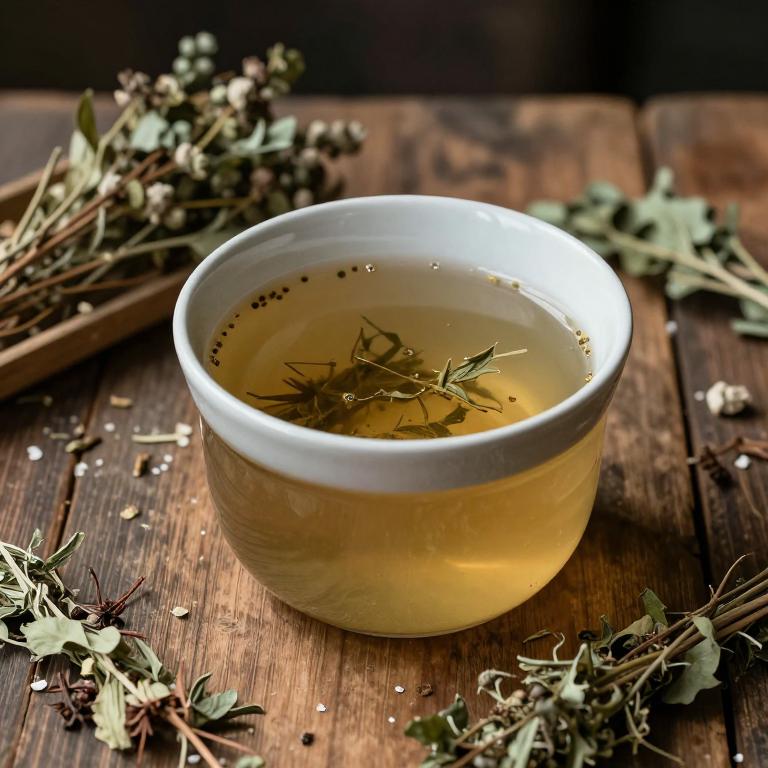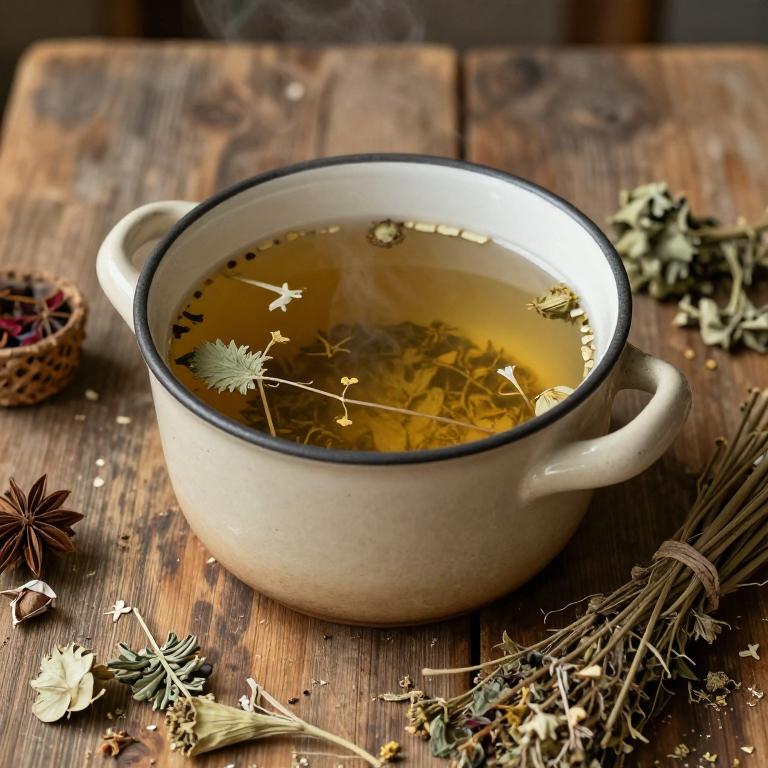10 Best Herbal Decoctions For Flu

Herbal decoctions have been traditionally used to alleviate flu symptoms and support the immune system.
Common herbs such as echinacea, elderberry, and garlic are often included in these preparations due to their antiviral and immune-boosting properties. To make a decoction, the herbs are typically simmered in water for an extended period to extract their active compounds. This method allows for the gentle release of beneficial nutrients and compounds that can help reduce fever, congestion, and fatigue.
While herbal decoctions can be a natural complement to conventional flu treatments, it is important to consult a healthcare provider, especially for individuals with pre-existing conditions or those taking medications.
Table of Contents
- 1. Echinacea (Echinacea purpurea)
- 2. Ginger (Zingiber officinale)
- 3. Thyme (Thymus vulgaris)
- 4. Peppermint (Mentha piperita)
- 5. Black elderberry (Sambucus nigra)
- 6. Rosemary (Rosmarinus officinalis)
- 7. Ceylon cinnamon (Cinnamomum verum)
- 8. Camellia (Camellia sinensis)
- 9. Parsley (Petroselinum crispum)
- 10. Licorice (Glycyrrhiza glabra)
1. Echinacea (Echinacea purpurea)

Echinacea purpurea, commonly known as purple coneflower, is a popular herbal remedy often used to support immune health and potentially reduce the severity and duration of flu symptoms.
Herbal decoctions made from Echinacea purpurea typically involve simmering the dried roots, leaves, and flowers in water to extract its active compounds, such as alkamides, caffeic acid derivatives, and polysaccharides. These compounds are believed to enhance immune response by stimulating the production of white blood cells and reducing inflammation. Studies suggest that Echinacea may help prevent or alleviate flu symptoms when taken at the onset of illness, though results can vary among individuals.
Despite its popularity, it is important to consult a healthcare provider before using Echinacea, especially for those with allergies or chronic health conditions.
2. Ginger (Zingiber officinale)

Zingiber officinale, commonly known as ginger, has been widely used in traditional medicine for its therapeutic properties, particularly in the treatment of flu symptoms.
Herbal decoctions made from fresh or dried ginger root are often prepared by boiling the rhizome in water to extract its active compounds, such as gingerol and shogaol, which possess anti-inflammatory and antioxidant effects. These decoctions are believed to help alleviate symptoms like nausea, sore throat, and muscle aches associated with the flu. The warming properties of ginger may also help to improve circulation and reduce congestion, supporting the body's natural defenses.
While ginger is generally safe and well-tolerated, it is advisable to consult a healthcare professional before using it as a complementary treatment for flu, especially for individuals with certain medical conditions or those taking medications.
3. Thyme (Thymus vulgaris)

Thymus vulgaris, commonly known as thyme, has been traditionally used in herbal medicine for its potent antiviral and antibacterial properties.
Herbal decoctions made from thymus vulgaris often involve simmering the dried leaves and flowers in water to extract its essential oils and active compounds, such as thymol and carvacrol. These compounds are known to support the immune system and may help alleviate symptoms of the flu by reducing inflammation and fighting off viral infections. Thyme decoctions are typically consumed as teas or added to steam inhalations to ease respiratory congestion.
While thyme is generally considered safe, it is advisable to consult a healthcare professional before using it, especially for individuals with allergies or those taking other medications.
4. Peppermint (Mentha piperita)

Mentha piperita, commonly known as peppermint, has been traditionally used in herbal medicine for its soothing and decongestant properties.
Peppermint herbal decoctions can help alleviate symptoms of the flu by reducing congestion, easing coughing, and providing a cooling effect on the throat. The essential oils in peppermint, such as menthol, act as natural antispasmodics and can help relieve chest discomfort and muscle aches associated with flu. To prepare a decoction, fresh or dried peppermint leaves are boiled in water and strained, often combined with honey or ginger for added benefits.
While peppermint can be a supportive remedy for flu symptoms, it is advisable to consult a healthcare professional, especially for severe or prolonged illness.
5. Black elderberry (Sambucus nigra)

Sambucus nigra, commonly known as European elderberry, has been traditionally used in herbal medicine for its potential immune-boosting properties.
Herbal decoctions made from the berries, flowers, and leaves of Sambucus nigra are often prepared by simmering the plant material in water to extract its active compounds. These decoctions are believed to support the body's natural defenses against viral infections, including the flu, due to their high content of flavonoids and antioxidants. Studies suggest that elderberry may reduce the duration and severity of flu symptoms by inhibiting viral replication.
However, it is important to use Sambucus nigra safely, as raw berries and certain parts of the plant can be toxic, and it should be used under the guidance of a healthcare professional.
6. Rosemary (Rosmarinus officinalis)

Rosmarinus officinalis, commonly known as rosemary, has been traditionally used in herbal medicine for its potential therapeutic properties.
Rosemary herbal decoctions are often prepared by simmering the dried leaves in water to extract their essential oils and active compounds. These decoctions are believed to support immune function and may help alleviate symptoms of the flu due to their antimicrobial and anti-inflammatory effects. The aromatic compounds in rosemary, such as rosmarinic acid and cineole, are thought to contribute to its beneficial properties.
While rosemary decoctions may offer supportive relief, they should not replace conventional medical treatments for the flu, and individuals should consult healthcare professionals before use.
7. Ceylon cinnamon (Cinnamomum verum)

Cinnamomum verum, commonly known as true cinnamon, has been traditionally used in herbal medicine for its potential benefits in alleviating flu symptoms.
The aromatic bark of this plant contains compounds like cinnamaldehyde, which may possess antimicrobial and anti-inflammatory properties. Herbal decoctions made from Cinnamomum verum are often prepared by simmering the bark in water to extract its active ingredients. These decoctions are believed to help reduce fever, soothe sore throats, and support the immune system during flu outbreaks.
However, while some studies suggest its efficacy, it is advisable to consult a healthcare professional before using cinnamon as a treatment for flu.
8. Camellia (Camellia sinensis)

Camellia sinensis, commonly known as the tea plant, is the source of various herbal decoctions that have been traditionally used for their potential health benefits, including supporting the immune system.
These decoctions, often made by boiling the leaves or stems of the plant, may contain bioactive compounds such as polyphenols, flavonoids, and caffeine, which are believed to have antimicrobial and anti-inflammatory properties. Some studies suggest that these compounds may help alleviate symptoms of the flu by reducing viral replication and enhancing immune response. However, while camellia sinensis decoctions may offer supportive benefits, they should not replace conventional medical treatments for flu.
It is important to consult a healthcare professional before using any herbal remedy, especially for individuals with underlying health conditions or those taking other medications.
9. Parsley (Petroselinum crispum)

Petroselinum crispum, commonly known as parsley, has been traditionally used in herbal medicine for its potential benefits in supporting immune health.
Herbal decoctions made from parsley are believed to help alleviate symptoms of the flu by promoting respiratory health and reducing inflammation. The essential oils and compounds found in parsley, such as apiol and myristicin, may have antiviral and antimicrobial properties that support the body's natural defenses. To prepare a decoction, fresh or dried parsley leaves are simmered in water for several minutes, allowing the active compounds to infuse into the liquid.
While parsley decoctions are not a substitute for medical treatment, they can be a complementary remedy to support recovery from flu symptoms when used as part of a holistic approach to wellness.
10. Licorice (Glycyrrhiza glabra)

Glycyrrhiza glabra, commonly known as licorice root, has been traditionally used in herbal medicine for its potential therapeutic effects on respiratory conditions, including the flu.
Herbal decoctions made from licorice root are prepared by simmering the dried root in water, allowing the active compounds such as glycyrrhizin and flavonoids to be extracted. These compounds may help reduce inflammation, soothe sore throats, and enhance the immune response, making licorice root a popular complementary remedy during flu season. However, excessive use of licorice root decoctions can lead to side effects like hypertension and electrolyte imbalances due to its potent effects on the body.
As a result, it is often recommended to use licorice root in moderation and consult a healthcare professional before incorporating it into a flu treatment regimen.